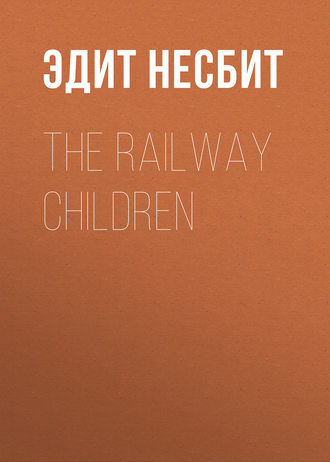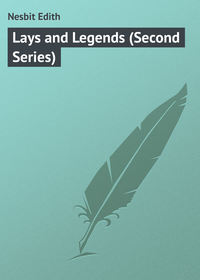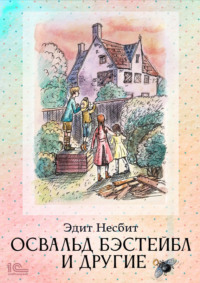 полная версия
полная версияThe Railway Children
“It’s nests,” said Peter, “swallows’ nests. We’re going to dry them in the oven and hang them up with string under the eaves of the coach-house.”
“Yes,” said Phyllis; “and then we’re going to save up all the wool and hair we can get, and in the spring we’ll line them, and then how pleased the swallows will be!”
“I’ve often thought people don’t do nearly enough for dumb animals,” said Peter with an air of virtue. “I do think people might have thought of making nests for poor little swallows before this.”
“Oh,” said Bobbie, vaguely, “if everybody thought of everything, there’d be nothing left for anybody else to think about.”
“Look at the nests—aren’t they pretty?” said Phyllis, reaching across Peter to grasp a nest.
“Look out, Phil, you goat,” said her brother. But it was too late; her strong little fingers had crushed the nest.
“There now,” said Peter.
“Never mind,” said Bobbie.
“It IS one of my own,” said Phyllis, “so you needn’t jaw, Peter. Yes, we’ve put our initial names on the ones we’ve done, so that the swallows will know who they’ve got to be so grateful to and fond of.”
“Swallows can’t read, silly,” said Peter.
“Silly yourself,” retorted Phyllis; “how do you know?”
“Who thought of making the nests, anyhow?” shouted Peter.
“I did,” screamed Phyllis.
“Nya,” rejoined Peter, “you only thought of making hay ones and sticking them in the ivy for the sparrows, and they’d have been sopping LONG before egg-laying time. It was me said clay and swallows.”
“I don’t care what you said.”
“Look,” said Bobbie, “I’ve made the nest all right again. Give me the bit of stick to mark your initial name on it. But how can you? Your letter and Peter’s are the same. P. for Peter, P. for Phyllis.”
“I put F. for Phyllis,” said the child of that name. “That’s how it sounds. The swallows wouldn’t spell Phyllis with a P., I’m certain-sure.”
“They can’t spell at all,” Peter was still insisting.
“Then why do you see them always on Christmas cards and valentines with letters round their necks? How would they know where to go if they couldn’t read?”
“That’s only in pictures. You never saw one really with letters round its neck.”
“Well, I have a pigeon, then; at least Daddy told me they did. Only it was under their wings and not round their necks, but it comes to the same thing, and—”
“I say,” interrupted Bobbie, “there’s to be a paperchase to-morrow.”
“Who?” Peter asked.
“Grammar School. Perks thinks the hare will go along by the line at first. We might go along the cutting. You can see a long way from there.”
The paperchase was found to be a more amusing subject of conversation than the reading powers of swallows. Bobbie had hoped it might be. And next morning Mother let them take their lunch and go out for the day to see the paperchase.
“If we go to the cutting,” said Peter, “we shall see the workmen, even if we miss the paperchase.”
Of course it had taken some time to get the line clear from the rocks and earth and trees that had fallen on it when the great landslip happened. That was the occasion, you will remember, when the three children saved the train from being wrecked by waving six little red-flannel-petticoat flags. It is always interesting to watch people working, especially when they work with such interesting things as spades and picks and shovels and planks and barrows, when they have cindery red fires in iron pots with round holes in them, and red lamps hanging near the works at night. Of course the children were never out at night; but once, at dusk, when Peter had got out of his bedroom skylight on to the roof, he had seen the red lamp shining far away at the edge of the cutting. The children had often been down to watch the work, and this day the interest of picks and spades, and barrows being wheeled along planks, completely put the paperchase out of their heads, so that they quite jumped when a voice just behind them panted, “Let me pass, please.” It was the hare—a big-boned, loose-limbed boy, with dark hair lying flat on a very damp forehead. The bag of torn paper under his arm was fastened across one shoulder by a strap. The children stood back. The hare ran along the line, and the workmen leaned on their picks to watch him. He ran on steadily and disappeared into the mouth of the tunnel.
“That’s against the by-laws,” said the foreman.
“Why worry?” said the oldest workman; “live and let live’s what I always say. Ain’t you never been young yourself, Mr. Bates?”
“I ought to report him,” said the foreman.
“Why spoil sport’s what I always say.”
“Passengers are forbidden to cross the line on any pretence,” murmured the foreman, doubtfully.
“He ain’t no passenger,” said one of the workmen.
“Nor ‘e ain’t crossed the line, not where we could see ‘im do it,” said another.
“Nor yet ‘e ain’t made no pretences,” said a third.
“And,” said the oldest workman, “‘e’s outer sight now. What the eye don’t see the ‘art needn’t take no notice of’s what I always say.”
And now, following the track of the hare by the little white blots of scattered paper, came the hounds. There were thirty of them, and they all came down the steep, ladder-like steps by ones and twos and threes and sixes and sevens. Bobbie and Phyllis and Peter counted them as they passed. The foremost ones hesitated a moment at the foot of the ladder, then their eyes caught the gleam of scattered whiteness along the line and they turned towards the tunnel, and, by ones and twos and threes and sixes and sevens, disappeared in the dark mouth of it. The last one, in a red jersey, seemed to be extinguished by the darkness like a candle that is blown out.
“They don’t know what they’re in for,” said the foreman; “it isn’t so easy running in the dark. The tunnel takes two or three turns.”
“They’ll take a long time to get through, you think?” Peter asked.
“An hour or more, I shouldn’t wonder.”
“Then let’s cut across the top and see them come out at the other end,” said Peter; “we shall get there long before they do.”
The counsel seemed good, and they went.
They climbed the steep steps from which they had picked the wild cherry blossom for the grave of the little wild rabbit, and reaching the top of the cutting, set their faces towards the hill through which the tunnel was cut. It was stiff work.
“It’s like Alps,” said Bobbie, breathlessly.
“Or Andes,” said Peter.
“It’s like Himmy what’s its names?” gasped Phyllis. “Mount Everlasting. Do let’s stop.”
“Stick to it,” panted Peter; “you’ll get your second wind in a minute.”
Phyllis consented to stick to it—and on they went, running when the turf was smooth and the slope easy, climbing over stones, helping themselves up rocks by the branches of trees, creeping through narrow openings between tree trunks and rocks, and so on and on, up and up, till at last they stood on the very top of the hill where they had so often wished to be.
“Halt!” cried Peter, and threw himself flat on the grass. For the very top of the hill was a smooth, turfed table-land, dotted with mossy rocks and little mountain-ash trees.
The girls also threw themselves down flat.
“Plenty of time,” Peter panted; “the rest’s all down hill.”
When they were rested enough to sit up and look round them, Bobbie cried:—
“Oh, look!”
“What at?” said Phyllis.
“The view,” said Bobbie.
“I hate views,” said Phyllis, “don’t you, Peter?”
“Let’s get on,” said Peter.
“But this isn’t like a view they take you to in carriages when you’re at the seaside, all sea and sand and bare hills. It’s like the ‘coloured counties’ in one of Mother’s poetry books.”
“It’s not so dusty,” said Peter; “look at the Aqueduct straddling slap across the valley like a giant centipede, and then the towns sticking their church spires up out of the trees like pens out of an inkstand. I think it’s more like
“There could he see the bannersOf twelve fair cities shine.”“I love it,” said Bobbie; “it’s worth the climb.”
“The paperchase is worth the climb,” said Phyllis, “if we don’t lose it. Let’s get on. It’s all down hill now.”
“I said that ten minutes ago,” said Peter.
“Well, I’VE said it now,” said Phyllis; “come on.”
“Loads of time,” said Peter. And there was. For when they had got down to a level with the top of the tunnel’s mouth—they were a couple of hundred yards out of their reckoning and had to creep along the face of the hill—there was no sign of the hare or the hounds.
“They’ve gone long ago, of course,” said Phyllis, as they leaned on the brick parapet above the tunnel.
“I don’t think so,” said Bobbie, “but even if they had, it’s ripping here, and we shall see the trains come out of the tunnel like dragons out of lairs. We’ve never seen that from the top side before.”
“No more we have,” said Phyllis, partially appeased.
It was really a most exciting place to be in. The top of the tunnel seemed ever so much farther from the line than they had expected, and it was like being on a bridge, but a bridge overgrown with bushes and creepers and grass and wild-flowers.
“I KNOW the paperchase has gone long ago,” said Phyllis every two minutes, and she hardly knew whether she was pleased or disappointed when Peter, leaning over the parapet, suddenly cried:—
“Look out. Here he comes!”
They all leaned over the sun-warmed brick wall in time to see the hare, going very slowly, come out from the shadow of the tunnel.
“There, now,” said Peter, “what did I tell you? Now for the hounds!”
Very soon came the hounds—by ones and twos and threes and sixes and sevens—and they also were going slowly and seemed very tired. Two or three who lagged far behind came out long after the others.
“There,” said Bobbie, “that’s all—now what shall we do?”
“Go along into the tulgy wood over there and have lunch,” said Phyllis; “we can see them for miles from up here.”
“Not yet,” said Peter. “That’s not the last. There’s the one in the red jersey to come yet. Let’s see the last of them come out.”
But though they waited and waited and waited, the boy in the red jersey did not appear.
“Oh, let’s have lunch,” said Phyllis; “I’ve got a pain in my front with being so hungry. You must have missed seeing the red-jerseyed one when he came out with the others—”
But Bobbie and Peter agreed that he had not come out with the others.
“Let’s get down to the tunnel mouth,” said Peter; “then perhaps we shall see him coming along from the inside. I expect he felt spun-chuck, and rested in one of the manholes. You stay up here and watch, Bob, and when I signal from below, you come down. We might miss seeing him on the way down, with all these trees.”
So the others climbed down and Bobbie waited till they signalled to her from the line below. And then she, too, scrambled down the roundabout slippery path among roots and moss till she stepped out between two dogwood trees and joined the others on the line. And still there was no sign of the hound with the red jersey.
“Oh, do, DO let’s have something to eat,” wailed Phyllis. “I shall die if you don’t, and then you’ll be sorry.”
“Give her the sandwiches, for goodness’ sake, and stop her silly mouth,” said Peter, not quite unkindly. “Look here,” he added, turning to Bobbie, “perhaps we’d better have one each, too. We may need all our strength. Not more than one, though. There’s no time.”
“What?” asked Bobbie, her mouth already full, for she was just as hungry as Phyllis.
“Don’t you see,” replied Peter, impressively, “that red-jerseyed hound has had an accident—that’s what it is. Perhaps even as we speak he’s lying with his head on the metals, an unresisting prey to any passing express—”
“Oh, don’t try to talk like a book,” cried Bobbie, bolting what was left of her sandwich; “come on. Phil, keep close behind me, and if a train comes, stand flat against the tunnel wall and hold your petticoats close to you.”
“Give me one more sandwich,” pleaded Phyllis, “and I will.”
“I’m going first,” said Peter; “it was my idea,” and he went.
Of course you know what going into a tunnel is like? The engine gives a scream and then suddenly the noise of the running, rattling train changes and grows different and much louder. Grown-up people pull up the windows and hold them by the strap. The railway carriage suddenly grows like night—with lamps, of course, unless you are in a slow local train, in which case lamps are not always provided. Then by and by the darkness outside the carriage window is touched by puffs of cloudy whiteness, then you see a blue light on the walls of the tunnel, then the sound of the moving train changes once more, and you are out in the good open air again, and grown-ups let the straps go. The windows, all dim with the yellow breath of the tunnel, rattle down into their places, and you see once more the dip and catch of the telegraph wires beside the line, and the straight-cut hawthorn hedges with the tiny baby trees growing up out of them every thirty yards.
All this, of course, is what a tunnel means when you are in a train. But everything is quite different when you walk into a tunnel on your own feet, and tread on shifting, sliding stones and gravel on a path that curves downwards from the shining metals to the wall. Then you see slimy, oozy trickles of water running down the inside of the tunnel, and you notice that the bricks are not red or brown, as they are at the tunnel’s mouth, but dull, sticky, sickly green. Your voice, when you speak, is quite changed from what it was out in the sunshine, and it is a long time before the tunnel is quite dark.
It was not yet quite dark in the tunnel when Phyllis caught at Bobbie’s skirt, ripping out half a yard of gathers, but no one noticed this at the time.
“I want to go back,” she said, “I don’t like it. It’ll be pitch dark in a minute. I WON’T go on in the dark. I don’t care what you say, I WON’T.”
“Don’t be a silly cuckoo,” said Peter; “I’ve got a candle end and matches, and—what’s that?”
“That” was a low, humming sound on the railway line, a trembling of the wires beside it, a buzzing, humming sound that grew louder and louder as they listened.
“It’s a train,” said Bobbie.
“Which line?”
“Let me go back,” cried Phyllis, struggling to get away from the hand by which Bobbie held her.
“Don’t be a coward,” said Bobbie; “it’s quite safe. Stand back.”
“Come on,” shouted Peter, who was a few yards ahead. “Quick! Manhole!”
The roar of the advancing train was now louder than the noise you hear when your head is under water in the bath and both taps are running, and you are kicking with your heels against the bath’s tin sides. But Peter had shouted for all he was worth, and Bobbie heard him. She dragged Phyllis along to the manhole. Phyllis, of course, stumbled over the wires and grazed both her legs. But they dragged her in, and all three stood in the dark, damp, arched recess while the train roared louder and louder. It seemed as if it would deafen them. And, in the distance, they could see its eyes of fire growing bigger and brighter every instant.
“It IS a dragon—I always knew it was—it takes its own shape in here, in the dark,” shouted Phyllis. But nobody heard her. You see the train was shouting, too, and its voice was bigger than hers.
And now, with a rush and a roar and a rattle and a long dazzling flash of lighted carriage windows, a smell of smoke, and blast of hot air, the train hurtled by, clanging and jangling and echoing in the vaulted roof of the tunnel. Phyllis and Bobbie clung to each other. Even Peter caught hold of Bobbie’s arm, “in case she should be frightened,” as he explained afterwards.
And now, slowly and gradually, the tail-lights grew smaller and smaller, and so did the noise, till with one last WHIZ the train got itself out of the tunnel, and silence settled again on its damp walls and dripping roof.
“OH!” said the children, all together in a whisper.
Peter was lighting the candle end with a hand that trembled.
“Come on,” he said; but he had to clear his throat before he could speak in his natural voice.
“Oh,” said Phyllis, “if the red-jerseyed one was in the way of the train!”
“We’ve got to go and see,” said Peter.
“Couldn’t we go and send someone from the station?” said Phyllis.
“Would you rather wait here for us?” asked Bobbie, severely, and of course that settled the question.
So the three went on into the deeper darkness of the tunnel. Peter led, holding his candle end high to light the way. The grease ran down his fingers, and some of it right up his sleeve. He found a long streak from wrist to elbow when he went to bed that night.
It was not more than a hundred and fifty yards from the spot where they had stood while the train went by that Peter stood still, shouted “Hullo,” and then went on much quicker than before. When the others caught him up, he stopped. And he stopped within a yard of what they had come into the tunnel to look for. Phyllis saw a gleam of red, and shut her eyes tight. There, by the curved, pebbly down line, was the red-jerseyed hound. His back was against the wall, his arms hung limply by his sides, and his eyes were shut.
“Was the red, blood? Is he all killed?” asked Phyllis, screwing her eyelids more tightly together.
“Killed? Nonsense!” said Peter. “There’s nothing red about him except his jersey. He’s only fainted. What on earth are we to do?”
“Can we move him?” asked Bobbie.
“I don’t know; he’s a big chap.”
“Suppose we bathe his forehead with water. No, I know we haven’t any, but milk’s just as wet. There’s a whole bottle.”
“Yes,” said Peter, “and they rub people’s hands, I believe.”
“They burn feathers, I know,” said Phyllis.
“What’s the good of saying that when we haven’t any feathers?”
“As it happens,” said Phyllis, in a tone of exasperated triumph, “I’ve got a shuttlecock in my pocket. So there!”
And now Peter rubbed the hands of the red-jerseyed one. Bobbie burned the feathers of the shuttlecock one by one under his nose, Phyllis splashed warmish milk on his forehead, and all three kept on saying as fast and as earnestly as they could:—
“Oh, look up, speak to me! For my sake, speak!”
Chapter XII. What Bobbie brought home
“Oh, look up! Speak to me! For MY sake, speak!” The children said the words over and over again to the unconscious hound in a red jersey, who sat with closed eyes and pale face against the side of the tunnel.
“Wet his ears with milk,” said Bobbie. “I know they do it to people that faint—with eau-de-Cologne. But I expect milk’s just as good.”
So they wetted his ears, and some of the milk ran down his neck under the red jersey. It was very dark in the tunnel. The candle end Peter had carried, and which now burned on a flat stone, gave hardly any light at all.
“Oh, DO look up,” said Phyllis. “For MY sake! I believe he’s dead.”
“For MY sake,” repeated Bobbie. “No, he isn’t.”
“For ANY sake,” said Peter; “come out of it.” And he shook the sufferer by the arm.
And then the boy in the red jersey sighed, and opened his eyes, and shut them again and said in a very small voice, “Chuck it.”
“Oh, he’s NOT dead,” said Phyllis. “I KNEW he wasn’t,” and she began to cry.
“What’s up? I’m all right,” said the boy.
“Drink this,” said Peter, firmly, thrusting the nose of the milk bottle into the boy’s mouth. The boy struggled, and some of the milk was upset before he could get his mouth free to say:—
“What is it?”
“It’s milk,” said Peter. “Fear not, you are in the hands of friends. Phil, you stop bleating this minute.”
“Do drink it,” said Bobbie, gently; “it’ll do you good.”
So he drank. And the three stood by without speaking to him.
“Let him be a minute,” Peter whispered; “he’ll be all right as soon as the milk begins to run like fire through his veins.”
He was.
“I’m better now,” he announced. “I remember all about it.” He tried to move, but the movement ended in a groan. “Bother! I believe I’ve broken my leg,” he said.
“Did you tumble down?” asked Phyllis, sniffing.
“Of course not—I’m not a kiddie,” said the boy, indignantly; “it was one of those beastly wires tripped me up, and when I tried to get up again I couldn’t stand, so I sat down. Gee whillikins! it does hurt, though. How did YOU get here?”
“We saw you all go into the tunnel and then we went across the hill to see you all come out. And the others did—all but you, and you didn’t. So we are a rescue party,” said Peter, with pride.
“You’ve got some pluck, I will say,” remarked the boy.
“Oh, that’s nothing,” said Peter, with modesty. “Do you think you could walk if we helped you?”
“I could try,” said the boy.
He did try. But he could only stand on one foot; the other dragged in a very nasty way.
“Here, let me sit down. I feel like dying,” said the boy. “Let go of me—let go, quick—” He lay down and closed his eyes. The others looked at each other by the dim light of the little candle.
“What on earth!” said Peter.
“Look here,” said Bobbie, quickly, “you must go and get help. Go to the nearest house.”
“Yes, that’s the only thing,” said Peter. “Come on.”
“If you take his feet and Phil and I take his head, we could carry him to the manhole.”
They did it. It was perhaps as well for the sufferer that he had fainted again.
“Now,” said Bobbie, “I’ll stay with him. You take the longest bit of candle, and, oh—be quick, for this bit won’t burn long.”
“I don’t think Mother would like me leaving you,” said Peter, doubtfully. “Let me stay, and you and Phil go.”
“No, no,” said Bobbie, “you and Phil go—and lend me your knife. I’ll try to get his boot off before he wakes up again.”
“I hope it’s all right what we’re doing,” said Peter.
“Of course it’s right,” said Bobbie, impatiently. “What else WOULD you do? Leave him here all alone because it’s dark? Nonsense. Hurry up, that’s all.”
So they hurried up.
Bobbie watched their dark figures and the little light of the little candle with an odd feeling of having come to the end of everything. She knew now, she thought, what nuns who were bricked up alive in convent walls felt like. Suddenly she gave herself a little shake.
“Don’t be a silly little girl,” she said. She was always very angry when anyone else called her a little girl, even if the adjective that went first was not “silly” but “nice” or “good” or “clever.” And it was only when she was very angry with herself that she allowed Roberta to use that expression to Bobbie.
She fixed the little candle end on a broken brick near the red-jerseyed boy’s feet. Then she opened Peter’s knife. It was always hard to manage—a halfpenny was generally needed to get it open at all. This time Bobbie somehow got it open with her thumbnail. She broke the nail, and it hurt horribly. Then she cut the boy’s bootlace, and got the boot off. She tried to pull off his stocking, but his leg was dreadfully swollen, and it did not seem to be the proper shape. So she cut the stocking down, very slowly and carefully. It was a brown, knitted stocking, and she wondered who had knitted it, and whether it was the boy’s mother, and whether she was feeling anxious about him, and how she would feel when he was brought home with his leg broken. When Bobbie had got the stocking off and saw the poor leg, she felt as though the tunnel was growing darker, and the ground felt unsteady, and nothing seemed quite real.
“SILLY little girl!” said Roberta to Bobbie, and felt better.
“The poor leg,” she told herself; “it ought to have a cushion—ah!”
She remembered the day when she and Phyllis had torn up their red flannel petticoats to make danger signals to stop the train and prevent an accident. Her flannel petticoat to-day was white, but it would be quite as soft as a red one. She took it off.
“Oh, what useful things flannel petticoats are!” she said; “the man who invented them ought to have a statue directed to him.” And she said it aloud, because it seemed that any voice, even her own, would be a comfort in that darkness.
“WHAT ought to be directed? Who to?” asked the boy, suddenly and very feebly.
“Oh,” said Bobbie, “now you’re better! Hold your teeth and don’t let it hurt too much. Now!”
She had folded the petticoat, and lifting his leg laid it on the cushion of folded flannel.











